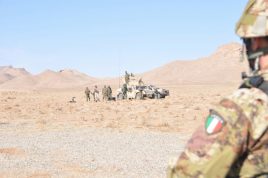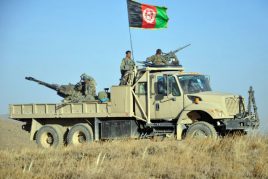
U.S. troops will be reduced to 8,600 from about 13,000 within 135 days, with full withdrawal within 14 months while the Taliban pledge not to shelter in Afghanistan terrorists organizations planning attacks abroad. These are the key points of the ‘ historic’ peace agreement, signed by White House top officials, Zalmay Khalilzad, and by Mullah Abdul Ghani Baradar on 29 February in Doha (Qatar), on behalf of the United States and the Taliban. Under the agreement, the Afghan government will release up to 5,000 Taliban prisoners in exchange for 1,000 Afghan security forces held by the Taliban. The exchange is to take place before 10 March – the scheduled date for the start of negotiations in Oslo between the Government of Kabul and the fundamentalist faction. The latter controls just under 70% of the country, the rest is under the leadership of the central government led by Ashraf Ghani, reconfirmed president of Afghanistan after the disputed vote in September 2019. If implemented, the agreement could put an end to 18 years of war that broke out in 2001 after Al Qaeda’s attack on the Twin Towers on 11 September, thereby allowing US troops to return home after many years. A wish repeatedly expressed by President Trump, in the race for re-election, who constantly declared that he intended to pull out the U.S. from the “endless wars” in the Middle East.
 There are presently more than 16,000 soldiers in Afghanistan under NATO Resolute Support Mission to train, advise and assist Afghan security forces, 8,000 of whom are Americans. Italy is present with 800 soldiers, 145 military land vehicles and 8 air vehicles. Personnel from 39 NATO member states and partner countries are deployed in Afghanistan. The number of Taliban fighters in the country is currently estimated at around 77,000, while the militiamen of the Islamic State are estimated at over 10,000. Since 2001, 3302 allied soldiers have lost their lives in Afghanistan, 2448 of whom are United States soldiers. Fifty-four Italian victims. The count of civilian deaths and casualties is estimated at 100 thousand.
There are presently more than 16,000 soldiers in Afghanistan under NATO Resolute Support Mission to train, advise and assist Afghan security forces, 8,000 of whom are Americans. Italy is present with 800 soldiers, 145 military land vehicles and 8 air vehicles. Personnel from 39 NATO member states and partner countries are deployed in Afghanistan. The number of Taliban fighters in the country is currently estimated at around 77,000, while the militiamen of the Islamic State are estimated at over 10,000. Since 2001, 3302 allied soldiers have lost their lives in Afghanistan, 2448 of whom are United States soldiers. Fifty-four Italian victims. The count of civilian deaths and casualties is estimated at 100 thousand.
Analyzing the deal. “It can be defined a historic agreement, since the Taliban are formally recognised as interlocutors at a negotiating table – but not with a view to a peace agreement. In fact, the aim of the agreement – Claudio Bertolotti, Director of Start InSight, a leading expert on Afghanistan, author of “Afghanistan contemporaneo. Dentro la guerra più lunga” (ed. Start InSight) – is US disengagement from a war that cannot be won, deferring peace talks between the Taliban and the Afghan government to bilateral negotiations that are bound to yield no results, not in the short to medium term at least. Indeed, there is a risk of new conflicts breaking out between the two disputing parties that don’t recognise each other.” “The essential condition that the U.S. has set is the reduction of violence in the country, leading to a virtually full withdrawal of U.S. forces within 14 months. If this should not happen, and it is very likely, the United States could leave a reduced military contingent to be expanded further.” The absence of references to civil rights in the agreement signed in Doha, in particular those of women – under the Taliban regime they had no right to study or work – is reflected in the all-Taliban premise “of
imposing an Islamic Emirate of Afghanistan. A goal that is now within reach
since – Bertolotti pointed out – America’s disengagement leaves no more obstacles to Taliban expansion, that will gradually occur along with a set of retrograde steps in terms of compliance with constitutional principles and civil rights of Afghan citizens. It is expected that the Taliban principles will be implemented in three quarters of the country, where the Government has no control whatsoever, albeit maybe less harshly than at the time of their regime (1996-2001). Both the U.S. and the Afghan government have realized this. It’s yet another defeat in the war lost in Afghanistan.
The Islamic Emirate of Afghanistan will be consolidated from a de facto to a de jure State. It’s only a matter of time. The Afghan Government, abandoned by the USA, however militarily equipped, will be left to face the Taliban alone, in a potential civil war scenario.
 Owing to lack of intelligence, logistical capacity, communication routes control, aviation, with a high rate of corruption, it will inevitably experience military defeat. That’s also why the Taliban are claiming victory in Doha.” Also Trump is proclaiming a victory. Bertolotti points out that the US president “will succeed in presenting the defeat in Afghanistan as a victory, using it as a precious bonus to be played in the election campaign. He will present himself as the one who ended the war, brought home the US soldiers and initiated a negotiated agreement between Afghans. This is likely to be a huge success at least in terms of communication and propaganda, yet it leaves the door open to the possibility of civil war. After 20 years of war, I believe that the Afghans are willing to accept any compromise solution to end the violence once and for all.”
Owing to lack of intelligence, logistical capacity, communication routes control, aviation, with a high rate of corruption, it will inevitably experience military defeat. That’s also why the Taliban are claiming victory in Doha.” Also Trump is proclaiming a victory. Bertolotti points out that the US president “will succeed in presenting the defeat in Afghanistan as a victory, using it as a precious bonus to be played in the election campaign. He will present himself as the one who ended the war, brought home the US soldiers and initiated a negotiated agreement between Afghans. This is likely to be a huge success at least in terms of communication and propaganda, yet it leaves the door open to the possibility of civil war. After 20 years of war, I believe that the Afghans are willing to accept any compromise solution to end the violence once and for all.”
Reactions in Kabul. “Whatever the reasons that led the two parties to sign this agreement, it’s a first step towards peace“, Father Giovanni Scalese, a Barnabite priest who leads the Mission sui iuris in Afghanistan, told SIR commenting on the US-Taliban accord. “But there’s still no peace”, the religious pointed out, highlighting the fact that “the agreement does not include a commitment for a ceasefire. It will be the subject of negotiations due to begin soon (10 March in Oslo, ed.’s note) between the Taliban and the Afghan government. Surely these negotiations are not going to be smooth.” Afghan President Ghani has already made it clear that “the announced release of prisoners should not be considered prior to the negotiations, it too will be the subject of future negotiations”. In any case, Father Scalese remarked,
“however arduous it may be, sooner or later this path must be taken in order to achieve true and lasting peace”
“The prevailing feeling at this moment, therefore, is one of great hope, mindful, however, of the difficulties that stand between a declaration of intent and actual results”.
For the Barnabite priest, “the greatest fear is that after the withdrawal of American and NATO troops the situation may deteriorate, with Afghanistan forced to relive the tragic experience of the civil war. Hence we can’t afford to indulge in naive enthusiasm, nor must we let ourselves be overwhelmed by pessimism.”
“We have prayed so much for peace over the years; we cannot give up now that we see a glimmer of light. We must continue to pray”, he concluded, “so that the Afghan people, drawing on the experience of the past tragic years, may find the courage to definitively reject the violence and embark on a process of reconciliation based on justice and forgiveness.”











